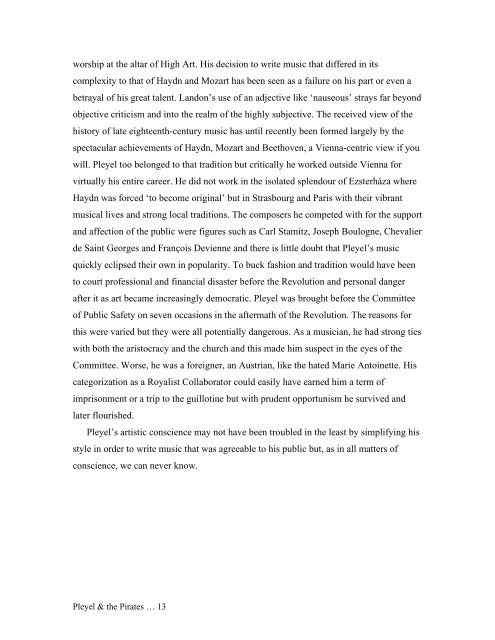Pleyel & the Pirates.pdf - ResearchSpace@Auckland
Pleyel & the Pirates.pdf - ResearchSpace@Auckland
Pleyel & the Pirates.pdf - ResearchSpace@Auckland
You also want an ePaper? Increase the reach of your titles
YUMPU automatically turns print PDFs into web optimized ePapers that Google loves.
worship at <strong>the</strong> altar of High Art. His decision to write music that differed in its<br />
complexity to that of Haydn and Mozart has been seen as a failure on his part or even a<br />
betrayal of his great talent. Landon’s use of an adjective like ‘nauseous’ strays far beyond<br />
objective criticism and into <strong>the</strong> realm of <strong>the</strong> highly subjective. The received view of <strong>the</strong><br />
history of late eighteenth-century music has until recently been formed largely by <strong>the</strong><br />
spectacular achievements of Haydn, Mozart and Beethoven, a Vienna-centric view if you<br />
will. <strong>Pleyel</strong> too belonged to that tradition but critically he worked outside Vienna for<br />
virtually his entire career. He did not work in <strong>the</strong> isolated splendour of Ezsterháza where<br />
Haydn was forced ‘to become original’ but in Strasbourg and Paris with <strong>the</strong>ir vibrant<br />
musical lives and strong local traditions. The composers he competed with for <strong>the</strong> support<br />
and affection of <strong>the</strong> public were figures such as Carl Stamitz, Joseph Boulogne, Chevalier<br />
de Saint Georges and François Devienne and <strong>the</strong>re is little doubt that <strong>Pleyel</strong>’s music<br />
quickly eclipsed <strong>the</strong>ir own in popularity. To buck fashion and tradition would have been<br />
to court professional and financial disaster before <strong>the</strong> Revolution and personal danger<br />
after it as art became increasingly democratic. <strong>Pleyel</strong> was brought before <strong>the</strong> Committee<br />
of Public Safety on seven occasions in <strong>the</strong> aftermath of <strong>the</strong> Revolution. The reasons for<br />
this were varied but <strong>the</strong>y were all potentially dangerous. As a musician, he had strong ties<br />
with both <strong>the</strong> aristocracy and <strong>the</strong> church and this made him suspect in <strong>the</strong> eyes of <strong>the</strong><br />
Committee. Worse, he was a foreigner, an Austrian, like <strong>the</strong> hated Marie Antoinette. His<br />
categorization as a Royalist Collaborator could easily have earned him a term of<br />
imprisonment or a trip to <strong>the</strong> guillotine but with prudent opportunism he survived and<br />
later flourished.<br />
<strong>Pleyel</strong>’s artistic conscience may not have been troubled in <strong>the</strong> least by simplifying his<br />
style in order to write music that was agreeable to his public but, as in all matters of<br />
conscience, we can never know.<br />
<strong>Pleyel</strong> & <strong>the</strong> <strong>Pirates</strong> … 13














